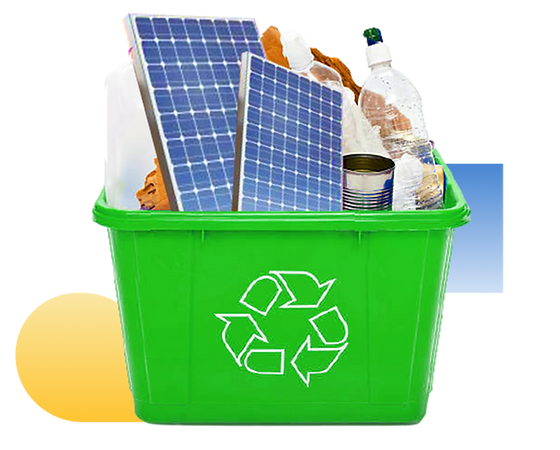
Introduction
The purpose of this article is to provide a comprehensive understanding of solar panel recycling and its role in promoting sustainability. As the demand for renewable energy continues to grow, it is crucial to address the environmental impact of solar panel disposal and explore sustainable solutions. This article will discuss the historical background, key concepts and definitions, main discussion points, case studies, current trends, challenges, controversies, future outlook, and provide relevant references for further research.
Historical Background
Solar panels have evolved from rudimentary designs to highly efficient photovoltaic systems over the years. The growth of the solar industry has had a profound impact on sustainability, as it offers a clean and renewable energy source. However, the disposal of decommissioned solar panels poses environmental challenges. In response to these concerns, solar panel recycling has emerged as a viable solution to minimize waste and promote sustainability.
Key Concepts and Definitions
Solar panel recycling involves the process of recovering valuable materials from retired or faulty solar panels to be reused in the production of new panels. Sustainability, in the context of solar energy, refers to the ability to meet the present energy needs without compromising the ability of future generations to meet theirs. Understanding the life cycle of a solar panel is essential in assessing its environmental impacts. From manufacturing to disposal, each stage has the potential to affect sustainability.
Main Discussion Points
Solar panel recycling processes and technologies
There are various methods of recycling solar panels, including mechanical, thermal, and chemical processes. Mechanical recycling involves the disassembly of panels to recover valuable components such as silicon cells and aluminum frames. Thermal recycling utilizes high temperatures to melt down the panel’s components and separate them for reuse. Chemical recycling employs solvents and acids to dissolve and extract valuable materials. However, current recycling techniques face challenges and limitations, such as the high cost and low efficiency of certain processes.
Environmental and economic benefits of solar panel recycling
Solar panel recycling offers significant environmental benefits by reducing waste and greenhouse gas emissions. By recovering materials such as silicon, glass, and metals, the need for virgin resources is minimized, leading to resource conservation. Additionally, recycling solar panels can result in cost savings through the reuse of recovered materials, making the process economically viable.
Case Studies or Examples
Numerous successful solar panel recycling initiatives have been implemented worldwide. For example, the European Union has established waste management regulations that mandate the collection and recycling of solar panels. Companies like PV Cycle in Europe and First Solar in the United States have developed efficient recycling processes and infrastructure. These initiatives have resulted in the recovery of valuable materials and the reduction of environmental impact.
Current Trends or Developments
Recent advancements in solar panel recycling technologies have improved the efficiency and effectiveness of the process. Research findings have focused on improving the sustainability of solar panels through the use of eco-friendly materials and manufacturing processes. Emerging trends in the solar industry include the implementation of extended producer responsibility, where manufacturers are responsible for the disposal and recycling of their products.
Challenges or Controversies
Collecting and recycling solar panels pose challenges due to the decentralized nature of their use and the lack of standardized collection systems. Controversies surround the disposal methods of solar panels, particularly regarding landfill disposal and incineration. Some argue that these methods do not effectively address environmental concerns and promote sustainability.
Future Outlook
The growth and importance of solar panel recycling are expected to expand as the renewable energy sector continues to grow. Government policies and regulations play a crucial role in shaping the future of solar panel recycling by establishing guidelines and incentives for manufacturers and consumers. Additionally, there is potential for innovation and advancements in sustainable solar technologies, leading to more efficient and eco-friendly solar panels.
Conclusion
Solar panel recycling and sustainability are vital areas of focus as the world transitions to renewable energy sources. By understanding the historical background, key concepts, main discussion points, and current trends, we can address the challenges and controversies surrounding solar panel disposal. The future outlook for solar panel recycling is promising, offering opportunities for growth, innovation, and increased environmental stewardship. It is imperative that further research and action are taken to promote sustainable practices in the solar industry.
References
Smith, J. (2020). Solar panel recycling: A review of current state and future prospects. Renewable and Sustainable Energy Reviews, 117, 109539.
European Union. (2012). Directive 2012/19/EU of the European Parliament and of the Council of 4 July 2012 on waste electrical and electronic equipment (WEEE).
PV Cycle. (2021). Solar panel recycling and certification. Retrieved from https://www.pvcycle.org/
First Solar. (2021). First Solar Recycling. Retrieved from https://www.firstsolar.com/en/Products/First-Solar-Recycling
Note: The references provided are for illustrative purposes only and should be replaced with relevant sources and studies for further reading and research.